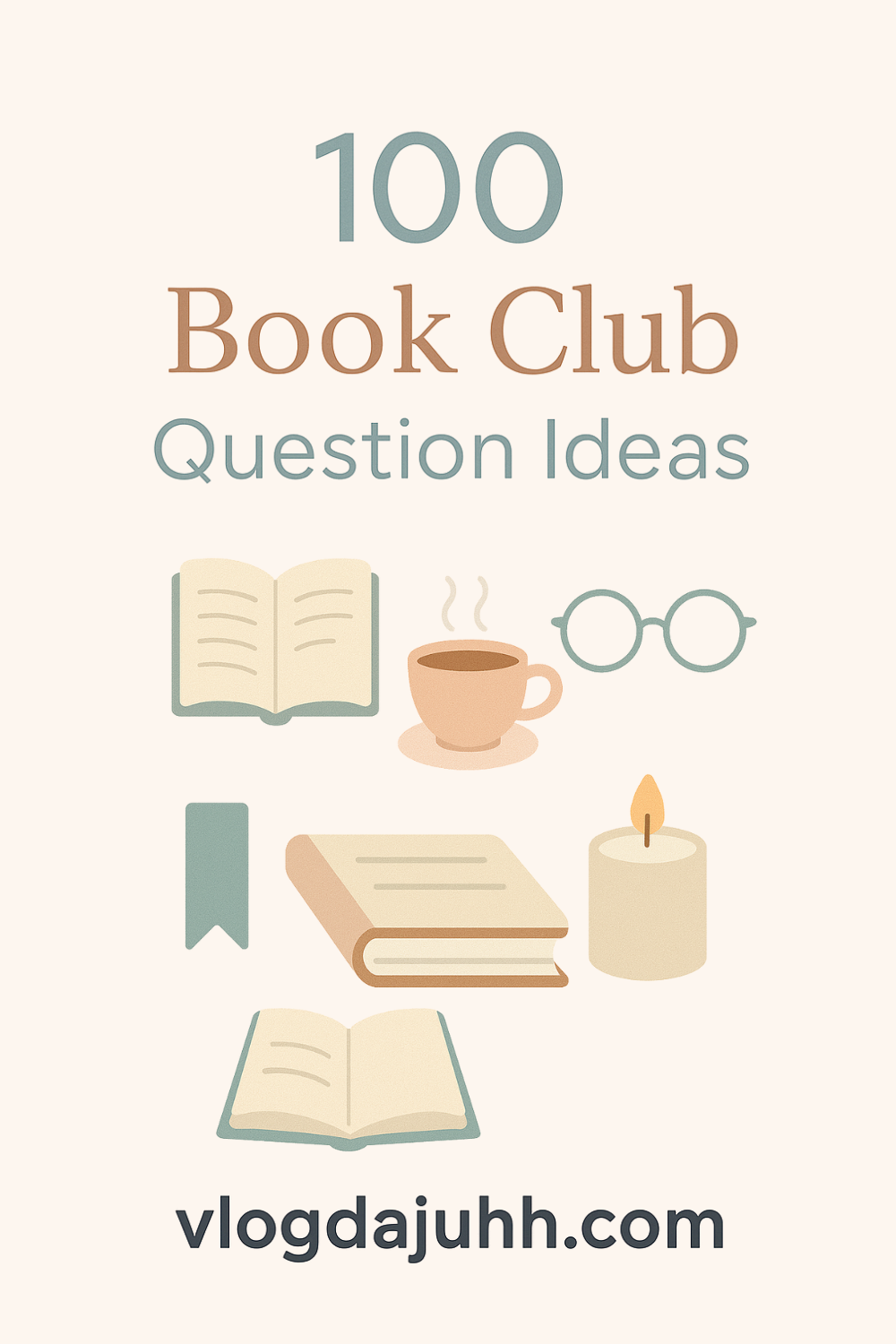This post may contain affiliate links. When you make a purchase through these links, you’re supporting the creation of content here on the blog, at no extra cost to you. Thank you for your support.

📌 Love these ideas? Save this post on Pinterest to come back to it anytime!
Writing Style and Author’s Craft
The author’s writing style is an integral part of how a book communicates its message. These questions examine the effectiveness of the author’s choices in telling the story.
51. How would you describe the author’s writing style?
The writing style is crucial to a book’s tone and feel. This question helps describe the author’s approach to storytelling.
52. Did the author use any unique narrative techniques or structures?
Narrative techniques, like flashbacks or alternating perspectives, can make a book stand out. This question explores these techniques.
53. Was the language used in the book particularly impactful or memorable?
The language of a book can evoke emotions or create vivid imagery. This question invites the group to reflect on the language used.
54. How did the pacing of the story affect your reading experience?
Pacing determines how quickly or slowly a story unfolds. This question examines how pacing impacted the overall experience.
55. Did the author create a vivid sense of place through description?
A strong sense of place can immerse the reader in the story. This question looks at how well the author created this atmosphere.
56. How effective was the dialogue in revealing character personalities?
Dialogue is key to revealing character traits. This question examines whether the dialogue helped flesh out the characters.
57. Were there any literary devices that the author used effectively?
Literary devices, such as metaphors, similes, or foreshadowing, can enhance a story. This question encourages the group to identify and discuss them.
58. How did the author use suspense to keep you engaged?
Suspense is a powerful tool to maintain interest. This question discusses how the author built suspense and tension.
59. Was the tone of the book consistent throughout?
Tone influences how we experience a story. This question examines whether the tone stayed consistent and how it shaped the narrative.
60. Did the author create a strong emotional connection through their writing?
The emotional connection between the reader and the story is key to its impact. This question explores how the author achieved this.

Book Genre and Comparison
Books in different genres offer distinct experiences. These questions explore the genre and how it compares to other books or genres.
61. How does this book compare to other books in the same genre?
Comparing books within a genre helps highlight what makes a book unique or typical of that genre.
62. Would you consider this book a genre-defining work? Why or why not?
Some books push the boundaries of their genre. This question invites discussion on whether the book is a genre-defining piece.
63. Did the book fit the expectations of the genre?
Genres often come with specific tropes and expectations. This question looks at whether the book adhered to or subverted those expectations.
64. What other books would you compare this one to?
Comparing books helps situate them within a larger literary landscape. This question encourages the group to think about similar works.
65. How does the book reflect or subvert typical tropes in its genre?
Certain genres have well-known tropes. This question explores how the book adhered to or twisted those conventions.
66. Would this book appeal to fans of other books or series? Why or why not?
This question helps the group identify which other works might share similarities with the book.
67. Does this book include elements of other genres, like fantasy, historical fiction, or mystery?
Many books mix genres to create something unique. This question explores how the book blends or borrows from other genres.
68. How does the book’s genre influence the way the story is told?
The genre can shape the structure and tone of a book. This question encourages a discussion on how genre impacted storytelling.
69. Was the book successful in capturing the essence of its genre?
Some books capture the spirit of a genre more effectively than others. This question explores the success of the book in this regard.
70. Does this book challenge typical genre conventions? How?
This question invites readers to reflect on how the book pushed or altered typical genre boundaries.
Personal Reflection Questions
Books can often resonate on a personal level. These questions help participants reflect on how the book relates to their own lives and experiences.
71. Did the book remind you of any personal experiences?
Personal connections to a book can make the reading experience richer. This question invites the group to reflect on their own experiences.
72. How did this book change or reinforce your views on certain topics?
Books have the power to change perspectives. This question helps participants reflect on how the book impacted their views.
73. Were there any parts of the book that made you uncomfortable? Why?
Books often tackle difficult topics. This question explores moments that might have been challenging to read.
74. Did the book inspire you to take any action or make any changes in your life?
Many books motivate readers to take action. This question explores how the book influenced real-life choices.
75. Did you find any part of the book particularly relatable?
Books often contain moments that resonate with readers. This question helps participants share what they found relatable.
You’re almost there! 🎉
Click below to discover the final 25 ideas and finish with a burst of creativity! 📓🧠🍷

